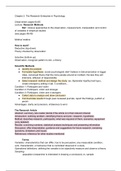Notes de cours
Chapter 2: Research Enterprises in Psychology
- Cours
- Établissement
- Book
Notes for the second chapter of the textbook Weiten, W. & McCann, D. (2019). Psychology: Themes and Variations. Fifth Canadian Edition. Nelson Education Ltd. as well as lecture notes for research enterprises in Psych.
[Montrer plus]



